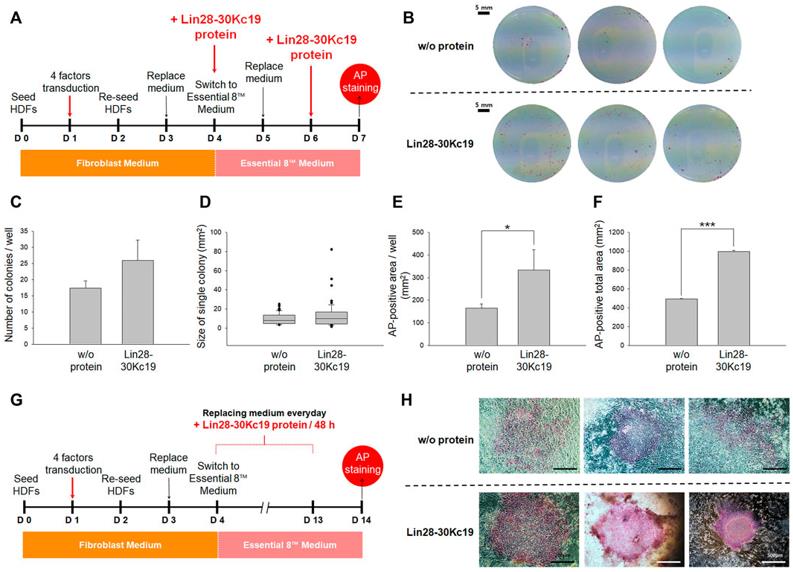Owing to many restrictions caused by the direct integration of the gene fragments into chromosome, protein instead of DNA has been exceptionally deliberated, which has no concern about chromosomal integration of genes. Creative Biolabs provides both mouse and human recombinant iPSC proteins in the form of either purified protein or crude cell lysate, which eliminates genome manipulation associated with vector-based iPSC factors.
Although many strategies have been developed to minimize the genomic integration, which may subsequently reduce the potential risks, all the methods developed to date still involve the use of genetic materials, which may still pose unexpected genetic modifications. Any DNA-based reprogramming approach will present the possibility of random integration. The chance of integration increases for reprogramming with transient plasmids because of repeated transfections. Nucleofection appears to promote the integration of reprogramming plasmids. One of the possible ways to avoid the introduction of exogenous genetic materials to target cells is delivery of the reprogramming proteins directly into the cells. Although expression of reprogramming factors as proteins would be an ideal method to generate footprint-free iPSCs, much work needs to be done before protein reprogramming is a viable method.
Zhou et al. reported the first successful generation of protein-induced pluripotent stem cells (piPS cells) using four rounds of protein transduction of the reprogramming factors tagged with poly-arginine in the presence of VPA. Their reprogramming proteins were produced in E. coli; thus, the protein purification and refolding are necessary. Human iPSC lines with protein transductions without VPA have also been established. In contrast to the production of the mouse reprogramming proteins in E. coli, the human reprogramming employed reprogramming proteins produced in HEK293 cells. Reprogramming proteins produced in mammalian cells may be superior to proteins from bacteria because bacteria lack eukaryotic posttranslational modifications. Furthermore, the bacterial recombinant proteins may be mis-folded during the artificial renaturation process. Global gene expression analysis revealed that the piPS cells were similar to mES cells. In addition, the piPS cells could differentiate into various cell types, such as neurons, cardiomyocytes, pancreatic and hepatic cells, which suggests that the piPS cells are morphologically, molecularly and functionally similar to the classic mES cells.
Creative Biolabs provides delivery service of the reprogramming proteins directly into the cells to avoid the introduction of exogenous genetic materials to target cells. Creative Biolabs is guaranteed to provide highly efficient iPS cell derivation services of different cells with our advanced technology, including reprogramming factor delivery by protein. contact us today to discuss your iPSC project with a technical specialist.
Our iPSC Reprogramming service consists of multiple stages. Here's how our service works:
| Key Processes | Descriptions |
| Cell Collection and Culture | We can work with a variety of somatic cell types that clients may provide, including fibroblasts and blood cells. |
| Stem Cell Reprogramming |
|
| Generated iPSC Characterization | This includes verification of pluripotency through various molecular and cellular assays. Furthermore, we make certain that the cells retain the capacity to differentiate into different cell types through differentiation assays. |
Our protein reprogramming service yields iPSCs that are compatible with applications in disease modeling, compound screening, cellular therapy, and iPSC regenerative medicine. Our team of stem cell experts is ready to provide comprehensive and customized services to meet the specific requirements of our clients. With our meticulous quality control and assurance procedures, we deliver high-quality, clinically relevant iPSCs ready for downstream applications.
Our team uses protein reprogramming, which has significantly improved efficiency and safety compared to other reprogramming methods.
Below are the findings presented in the article related to iPSC reprogramming factors delivery by protein.
Researchers have demonstrated an innovative approach to increase the efficiency of hiPSC generation through protein-based delivery. This is achieved by using the important transcription factor Lin28 fused to the cell-penetrating protein 30Kc19 in the form of a recombinant fusion protein. Large-scale production of the soluble form of the Lin28-30Kc19 protein was achieved, and consequently human dermal fibroblasts (HDF) were processed, along with four transcription factors (Oct4, Sox2, c-Myc, and Klf4), which pass through retroviruses.
Due to the cell-penetrating and protein-stabilizing properties of 30Kc19 proteins, the addition of Lin28-30Kc19 proteins improves the efficiency of hiPSC generation, which enables intracellular delivery and maintains the stability of the transcription factor Lin28.
 Fig. 1 Characterization of hiPSCs generated by the addition of the Lin28-30Kc19 protein.1
Fig. 1 Characterization of hiPSCs generated by the addition of the Lin28-30Kc19 protein.1
Reference
For Research Use Only. Not For Clinical Use.